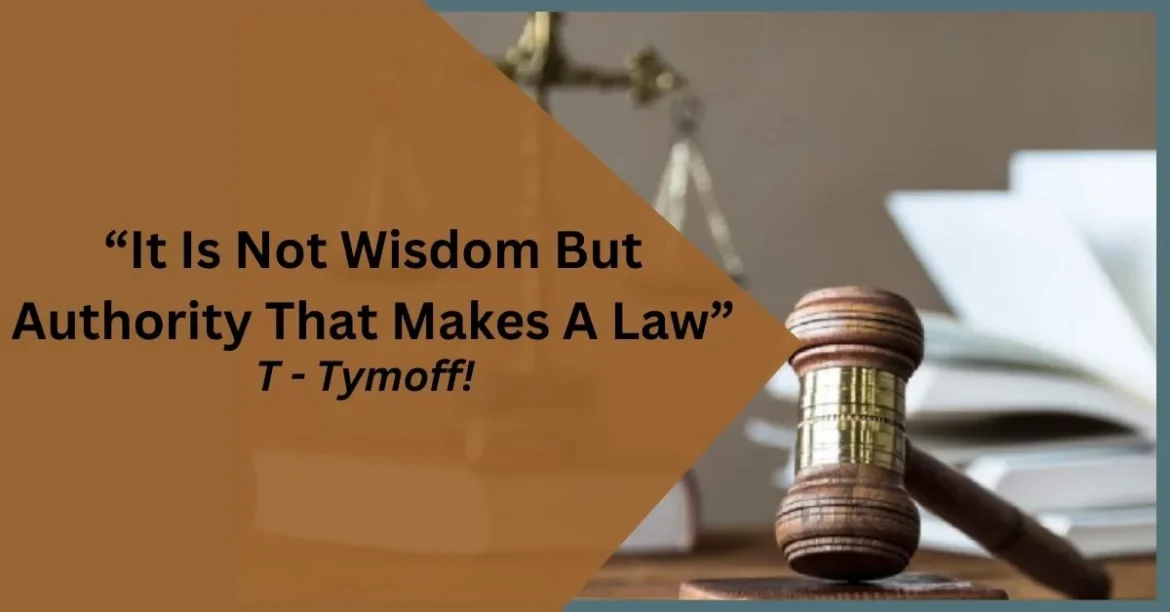
Explore the meaning behind “It is not wisdom but authority that makes a law – T – Tymoff.” Discover how authority, not wisdom, plays a key role in law-making and societal order.
Introduction
The phrase “It is not wisdom but authority that makes a law – T – Tymoff” delves into the complex nature of law-making, highlighting the essential role that authority plays in shaping society’s legal framework. In a world where laws govern almost every aspect of life, this saying resonates as a thought-provoking reflection on the relationship between wisdom, authority, and the enforcement of laws.
Laws are the foundation of social order, intended to provide structure and maintain justice. However, the process by which laws are made and enforced often prioritizes the authority behind them rather than the wisdom or moral reasoning. This article will explore the deeper meaning of this phrase, the role of authority in law-making, and how this perspective aligns with historical and modern contexts.
Understanding the Phrase “It Is Not Wisdom But Authority That Makes a Law – T – Tymoff”
At its core, the phrase suggests that laws derive their power not from the wisdom or righteousness of their content but from the authority that enforces them. Whether a law is just, ethical, or wise is secondary to the fact that it is backed by power—typically in the form of governmental or institutional authority.
Let’s break down this statement:
- Authority Over Wisdom: While wisdom implies thoughtful insight, understanding, and fairness, authority is the power to enforce laws, regardless of their inherent fairness or wisdom. Laws are enacted by governing bodies with the authority to ensure compliance.
- Power Dynamics in Law-making: Throughout history, laws have been shaped more by those who hold power than by those who are considered wise. Rulers, governments, and other authorities have established laws to maintain control, protect their interests, and ensure societal order.
- Real-World Application: This phrase reflects the reality that not all laws are wise or just, yet they are still followed because they are backed by a governing authority. Even in democratic societies, laws are passed by elected officials whose authority to legislate comes from the people, but this does not always guarantee that every law is wise or equitable.
Authority vs. Wisdom in the Law-Making Process
In theory, laws should be created with wisdom—taking into account justice, fairness, and the greater good. However, in practice, laws are often shaped more by the authority behind them. Understanding the distinction between authority and wisdom in law-making helps explain why unjust or poorly designed laws can exist and persist.

The Role of Authority in Law-Making
- Governments and Legal Systems: Governments, whether democratic or authoritarian, hold the power to create and enforce laws. The legitimacy of these laws comes from the recognized authority of the government, not necessarily from their inherent wisdom.
- Enforcement of Laws: Laws are only effective when they are enforced by an authority. Without enforcement, even the wisest laws would hold no real power. This illustrates that authority, not wisdom, is the driving force behind legal compliance.
- Historical Examples of Authority in Law-making:
- Ancient Rome: The Roman Empire created laws that reflected the will of its rulers and authorities. Many laws were designed to consolidate power rather than promote wisdom or justice.
- Totalitarian Regimes: In many authoritarian regimes, laws are enacted to maintain control and suppress opposition, often with little regard for wisdom or justice.
- Modern Legal Systems: Even in democratic societies, where laws are debated and voted upon, the final say often lies with those in positions of authority. Courts and law enforcement agencies execute and enforce these laws, underscoring the critical role of authority in the legal process.
The Role of Wisdom in Law-Making
- Idealistic View of Law-Making: In an ideal world, laws would be the product of wisdom—crafted by experts and philosophers who understand the complexities of justice, fairness, and human rights. These laws would aim to improve society by being reasonable, just, and thoughtful.
- Challenges of Applying Wisdom in Law-Making:
- Subjectivity of Wisdom: What is considered wise may vary from person to person. Wisdom is subjective, whereas authority is more concrete.
- Conflict Between Authority and Wisdom: In many cases, wise ideas may clash with the interests of those in power, preventing these ideas from becoming law.
- Examples of Wisdom in Law-Making:
- Constitutional Laws: Documents like the U.S. Constitution are based on principles of fairness, justice, and wisdom. However, even these laws are subject to interpretation and enforcement by authorities.
- Human Rights Legislation: Many modern laws, particularly those surrounding human rights, aim to reflect wisdom by promoting equality and justice. Yet, they still require authority for enforcement.
The Balance Between Authority and Wisdom
Striking a balance between authority and wisdom in law-making is crucial for a just society. While authority is necessary for laws to be implemented and upheld, wisdom ensures that these laws are designed for the common good. However, history has shown that achieving this balance is easier said than done.
- The Influence of Power: Those in positions of power often prioritize maintaining control over implementing wise and just laws. This can lead to laws that are more beneficial to the ruling class or those in authority rather than society as a whole.
- The Role of the People: In democratic societies, the people have a degree of power to influence laws by electing representatives and advocating for change. However, the ultimate authority to enact and enforce laws still lies with the government.
Conclusion
The phrase “It is not wisdom but authority that makes a law – T – Tymoff” serves as a stark reminder of the reality behind law-making. While wisdom should ideally guide the creation of laws, authority is the true force that gives them power and ensures their enforcement. Understanding this distinction helps explain why unjust or unwise laws can persist and highlights the importance of balancing authority with wisdom in shaping a fair and just society.
FAQs
Q1: Why does the phrase emphasize authority over wisdom in law-making?
- The phrase emphasizes authority because, in practice, laws are enforced by power rather than wisdom. While wisdom may guide the creation of laws, authority is necessary to implement and ensure compliance with those laws.
Q2: Can laws be both wise and authoritative?
- Yes, laws can be both wise and authoritative. Ideally, wise laws that promote justice and fairness should be backed by the authority necessary to enforce them. However, this balance is not always achieved in practice.
Q3: What happens when authority creates unwise laws?
- When authority creates unwise laws, society may suffer from injustice or oppression. However, as long as these laws are enforced by authority, they remain in effect unless they are changed through legislative reform or social movements.
Q4: How can society ensure that laws are both wise and fair?
- Society can ensure that laws are wise and fair by promoting transparency, encouraging public participation in the law-making process, and holding those in power accountable through democratic processes and legal checks and balances.
Q5: Does wisdom play any role in modern law-making?
- Yes, wisdom plays a role in modern law-making, particularly in democracies where laws are debated and crafted with input from experts, legislators, and the public. However, the ultimate authority to enact and enforce laws still rests with the governing bodies.
By understanding that “It is not wisdom but authority that makes a law – T – Tymoff,” we gain insight into the dynamics of power and law-making, and the ongoing challenge of creating a society where laws reflect both authority and wisdom.



